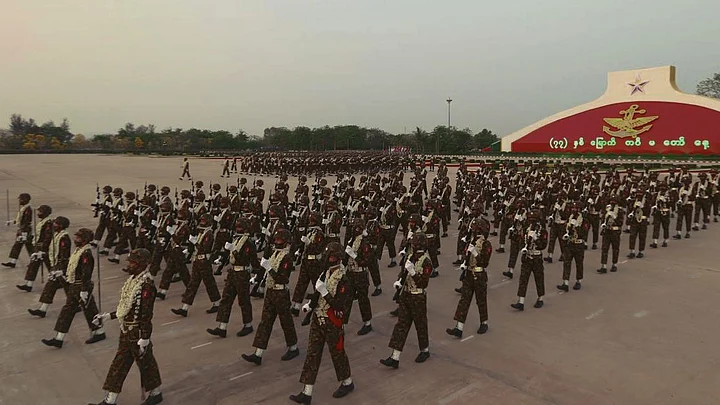"The modern state of Burma was born as a military occupation," wrote Burmese historian Thant Myint-U in his book The Hidden History of Burma: Race, Capitalism, and the Crisis of Democracy in the 21st Century.
Why are we talking about Myanmar's military? Because the Tatmadaw ("armed forces" in Burmese) is back in the news after it carried out the executions of four political prisoners on Monday, 25 July, a move that takes the country back decades.
The four men, who were sentenced to death in closed-door trials in January and April, had the charges of assisting the implementation of "terror acts," against them.
Zaw Min Tun, spokesperson for the military government, defended the executions at a press briefing. "If we compare their sentence with other death penalty cases, they have committed crimes for which they should have been given death sentences many times," he was quoted as saying by AFP.
On the other hand, Myanmar's National Unity Government (NUG), a shadow administration banned by the ruling junta, had slammed the executions and called for action to be taken against the army on a global scale.
"Extremely saddened. (We) condemn the junta's cruelty. The global community must punish their cruelty," the NUG president's office spokesperson Kyaw Zaw said.
How did the Tatmadaw get to such a powerful position? We should start with the freedom struggle.
The Burma Independence Army
The roots of the military can be traced back to Myanmar's independence movement.
The man at the center of the Burma Independence Army (BIA), a revolutionary army that collaborated with Japan to end British rule, was General Aung San, whose daughter, Aung San Suu Kyi, ironically, is serving time in prison after being sentenced by the military on a variety of charges, including corruption and the illegal import of walkie-talkies.
The BIA was founded in 1941, and Myanmar gained independence from the British in 1948.
Just before the independence was won, the BIA had started to join with the other small anti-colonial militias that were propping up across Burmese territory.
What is known as the Tatmadaw is the final product of that amalgamation.
The 1962 Coup and the One-Party State
The political dominance of the military started after the 1962 Burmese coup d'état that occurred on 2 March 1962.
The Tatmadaw overthrew the government led by Anti-Fascist People's Freedom League led by U Nu, and formed the Union Revolutionary Council, presided over by General Ne Win, who became the country's military dictator for the next 25 years.
During this period, the Tatmadaw's role in Myanmar's economy, politics, and state bureaucracy increased. The one-party state was ruled by the Burma Socialist Programme Party.
Opposition parties were banned and major industries and businesses were nationalised, and the military ruled virtually unopposed for the next 50 years.
Maintaining Control
After the 8888 Uprising (8 August 1988), which saw the rise of Aung San Suu Kyi as a national hero, the military junta allowed elections, in 1990. Nevertheless, the protests were brutally suppressed by the Tatmadaw, and more than 5,000 people died.
While Suu Kyi's party, the National League for Democracy, won more than 80 percent of the seats in the government, the military refused to abide by their pledge of free and fair elections, and continued to rule Myanmar. Suu Kyi was put under house arrest.
In 2008, the military drafted a new constitution that reserved 25 percent of all seats in national and local parliaments for Tatmadaw officials. According to this, the commander-in-chief of the military can supersede even the president's authority. The Constitution even gives the head of the military the "right to take over and exercise State sovereign power" if there is an "emergency."
Additionally, along with all these powers, the Tatmadaw continued to have a grip on the country’s mining and gas industries, giving them the required financial independence to keep the country running in whatever little capacity.
A 2020 report by Amnesty International revealed that a company known as Myanmar Economic Holdings Limited (MEHL) had made billions between 1990 and 2010 via military-controlled businesses in construction, agriculture, mining, and tobacco among others, as reported by Al Jazeera.
'Insulated in a Giant Echo Chamber'
The Tatmadaw has ensured over the years that it has control over all the institutions, including an intelligence apparatus, needed to maintain continued dominance.
But more than anything else, the military simply does not believe in power-sharing. Talking about how military officials in Myanmar perceive themselves and the rest of Burmese society, Scot Marciel, who served as US ambassador to Myanmar until 2020, told the BBC:
"They don't interact with the rest of society. They're insulated in a giant echo chamber where they're all telling each other how important they are, how only they can keep the country together, and how without them in power the country would fall apart."
After it overthrew the civilian government on 1 February 2021 and detained State Counsellor Aung San Suu Kyi, the military began an extremely violent crackdown on pro-democracy protesters, killing thousands. Almost 18 months on, it shows no signs of coming to a compromise with the pro-democracy protesters.
While international condemnation is ever-present, no country wants to really get into Myanmar's internal mess. It has found a major ally in China, which regularly supplies military weapons. ASEAN nations and India are also not keen on deteriorating relations with the military government. The US can criticise it from afar all it wants, but unless some concrete action is taken, the junta is here to stay for a long time.
(With inputs from the BBC and Al Jazeera.)
(At The Quint, we question everything. Play an active role in shaping our journalism by becoming a member today.)
